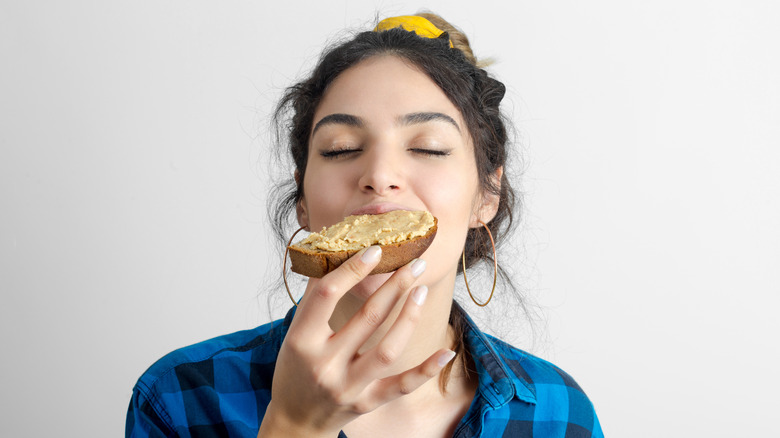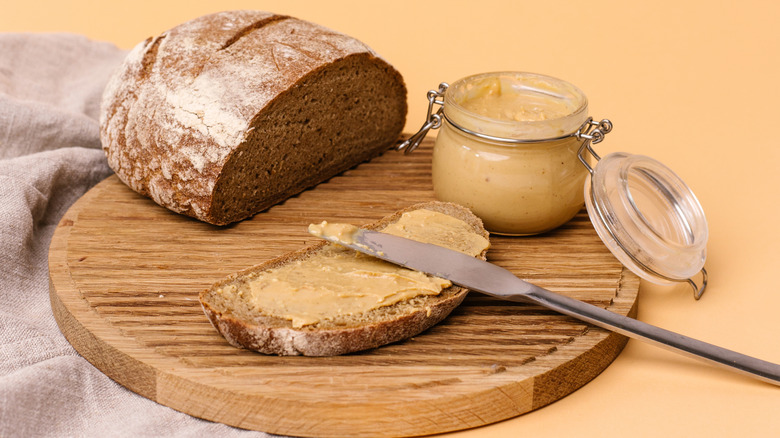When You Eat Peanut Butter Every Day, This Is What Happens To Your Appetite
Sometimes, our appetite can get the better of us.
Think of all those times when your growling tummy prompted you to overeat or when you reached for a bag of salty crisps while at work just because you'd missed lunch and felt the hunger pangs coming on. For people who are mindful of maintaining a healthy weight and for those trying to lose some pounds, keeping their appetite in check is a big part of it all. If you're always hungry, there's a higher chance of you giving into unhealthy cravings.
This is when you start thinking about adding healthy yet satiating foods to your diet, and peanut butter can be just that and more for you. Peanut butter is not only filling, but it can also help you feel full for longer. In fact, according to registered dietitian nutritionist Blanca Garcia, having about two tablespoons of peanut butter "may in fact keep you from eating 300 or 400 extra calories as snacks or other 'treats' later in the day, so it turns out to be a calorie savings, which is what you need for weight loss" (via Men's Health). What are the nutrients in peanut butter that curb your appetite?
Peanut butter contains quite a few nutrients that help curb hunger
Two tablespoons of smooth peanut butter (minus salt) contain 7.1 grams of protein, 16.4 grams of fat (mostly healthy fats — monounsaturated and polyunsaturated fatty acids), and 1.6 grams of dietary fiber, per the U.S. Department of Agriculture. All of these ingredients are helpful when it comes to curbing your appetite.
Fiber pulls water into the food you eat and makes it bulkier. This can help you feel full for longer. Protein takes longer to digest than other nutrients, and this can contribute to how satiated you feel, too. The same can be said about fats. Thus, when you eat peanut butter every day, you might notice changes in how often you feel hungry and, ultimately, how much you eat.
Additionally, peanut butter also contains some amounts of vitamin B6. This vitamin, along with other B vitamins, can control your appetite too. Vitamin B6 helps maintain healthy thyroid function and regulates your hunger hormone. A 2013 Purdue University study found that consuming meals with peanuts or peanut butter curbed appetite better than eating lower-energy density meals like rice cakes in obese women with type 2 diabetes risk. Does this mean anyone who's focused on weight loss or maintaining an ideal weight should focus largely on peanut butter?
Consuming peanut butter the right way
When you realize something positive happens to your weight loss goals by adding one great healthy food to your diet, it can become easy to over-rely on this food. The same can be said for appetite-suppressing peanut butter.
Yes, peanut butter has various benefits other than helping you stay full for longer. The healthy fats in the stuff are great for your heart health and combating diabetes, the fiber content can help with digestion, and the antioxidants (manganese, vitamin E, and B vitamins) in this nut butter can even help mitigate cancer risk.
But peanut butter is considered a high-calorie food (owing to its high fat content), and when you eat too much peanut butter, even in an effort to curb your appetite, you can quickly derail your weight management goals. Scoping out the healthiest brands of peanut butter you can eat — we're talking no added sugars, oils, or too much sodium — and sticking to the recommended two tablespoons or 32 grams a day is a good place to start. Avoid going for the stuff straight from the jar, as this can result in mindless eating and overconsumption. Combining the nut butter with other satiating foods like whole grains, yogurt, smoothies, and fiber-rich fruits can also help your appetite stay in check. If you're interested in reading about more foods that will help in this area, you can check out 14 foods that help curb hunger.


